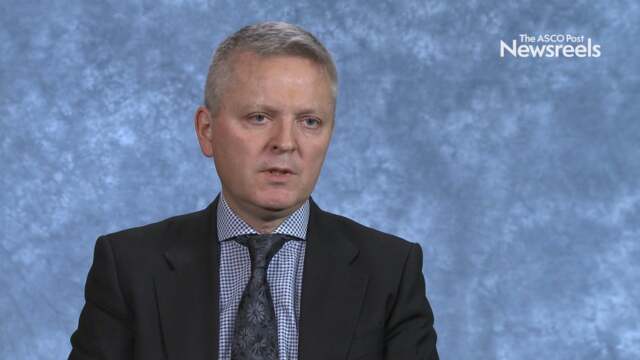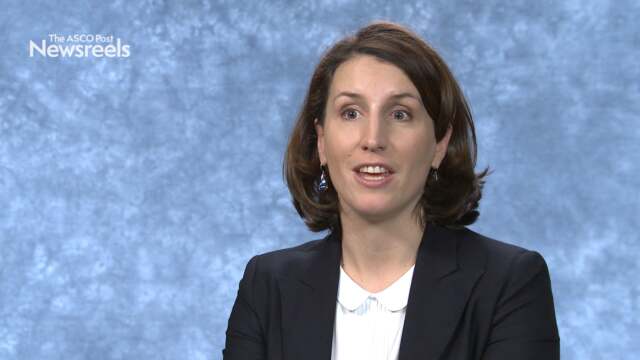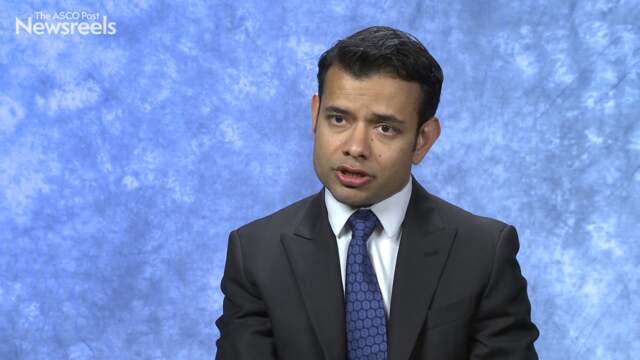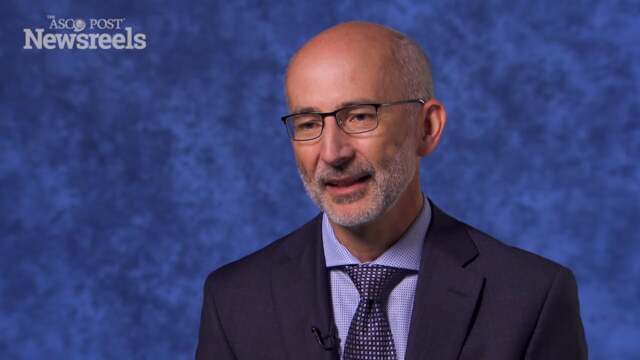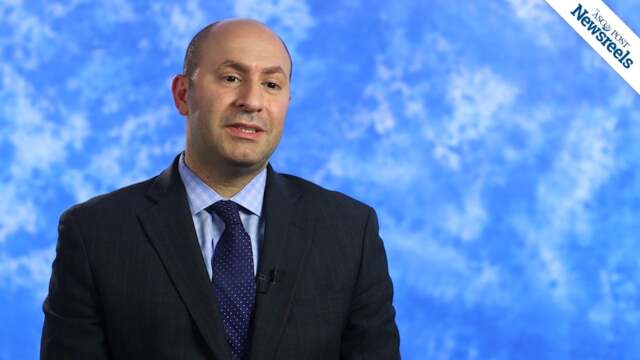NCCN Clinical Practice Guidelines in Oncology (NCCN Guidelines®): 2018 Guidelines Updates
In 1996, the National Comprehensive Cancer Network® (NCCN®) published its first set of Clinical Practice Guidelines in Oncology (NCCN Guidelines®) covering 8 tumor types. Guidelines are now published for more than 60 tumor types and topics. Some of the key updates were presented at NCCN’s 23rd...
Combined Immune Checkpoint and VEGF Inhibition: Exciting yet Challenging Time for Renal Cancer Therapeutics
The treatment paradigm for metastatic clear cell renal cell carcinoma continues to evolve at a rapid pace. We have recently approved agents that target the vascular endothelial growth factor receptor (VEGFR) pathway in the front-line setting—such as the tyrosine kinase inhibitor cabozantinib...
Combined Immune Checkpoint and VEGF Inhibition as First-Line Therapy in Advanced Clear Cell Kidney Cancer
In a dose-finding, dose-expansion phase Ib trial (JAVELIN Renal 100) reported in The Lancet Oncology, Toni K. Choueiri, MD, of Dana-Farber Cancer Institute and Brigham and Women’s Hospital, and colleagues determined the maximum tolerated dose of the immune checkpoint inhibitor avelumab (Bavencio)...
Results From AREN0533: Treating Higher-Risk Favorable-Histology Wilms Tumor
In a report from the Children’s Oncology Group AREN0533 study published in Journal of Clinical Oncology, Dix et al found improved survival outcomes with a modified approach to treatment of favorable-histology Wilms tumor with lung metastases. Study Details The National Wilms Tumor Study...
Phase II Study of Sunitinib Schedule in Metastatic Renal Cell Carcinoma
In a phase II study reported in the Journal of Clinical Oncology, Jonasch et al found evidence that a 2-weeks-on/1-week-off (2/1) schedule of sunitinib (Sutent) might be an option in frontline treatment of metastatic renal cell carcinoma. Study Details In the study, 59 patients with previously...
CB-839 in Combination With Cabozantinib for Advanced RCC Granted FDA Fast Track Designation
On April 18, Calithera Biosciences, Inc, announced that the U.S. Food and Drug Administration (FDA) granted Fast Track designation to CB-839 in combination with cabozantinib (Cabometyx) for the treatment of patients with metastatic renal cell carcinoma (RCC) who have received one or two prior lines ...
Update on ATLAS Trial of Axitinib as Adjuvant Treatment for Patients at High Risk of Renal Cell Carcinoma Recurrence After Surgery
Pfizer recently announced that the independent data monitoring committee for the phase III ATLAS trial, which is evaluating axitinib (Inlyta) as adjuvant therapy for patients at high risk of recurrent renal cell carcinoma (RCC) after nephrectomy, recommended stopping the trial at a planned interim...
FDA Approves Nivolumab/Ipilimumab Combination in Intermediate- or Poor-Risk Advanced RCC
On April 16, 2018, the U.S. Food and Drug Administration (FDA) granted approvals to nivolumab (Opdivo) and ipilimumab (Yervoy) in combination for the treatment of intermediate- or poor-risk previously untreated advanced renal cell carcinoma (RCC). CheckMate 214 The approvals were based on...
Nivolumab Plus Ipilimumab vs Sunitinib in Previously Untreated Advanced RCC
As reported in The New England Journal of Medicine by Motzer et al, the phase III CheckMate 214 trial has shown an overall survival advantage with nivolumab plus ipilimumab vs sunitinib in patients with previously untreated advanced renal cell carcinoma (RCC). Study Details In the open-label...
GU Symposium Focuses on Prognostic Model in Urothelial Cancer, Novel Therapies for Prostate and Kidney Cancers
THE 2018 GENITOURINARY Cancers Symposium hosted an international audience of oncologists and other stakeholders to hear about the latest advances in the field. We have included coverage of many of the top news stories from the meeting in previous issues of The ASCO Post. Here are summaries of a few ...
EAU 2018: Survey Shows Greater Suicide Rate in Patients With Urologic Cancers
A major UK survey has shown that patients with urologic cancer—such as prostate, bladder, or kidney cancer—are five times more likely to commit suicide than people without cancer. The analysis also shows that patients with cancer generally are around three times more likely to commit...
Activity of Combined Immune Checkpoint and VEGF Inhibition as First-Line Therapy in Advanced Clear Cell RCC
In the dose-finding, dose-expansion phase Ib JAVELIN Renal 100 trial reported in The Lancet Oncology, Choueiri et al identified the maximum tolerated dose of the immune checkpoint inhibitor avelumab (Bavencio) in combination with the vascular endothelial growth factor inhibitor axitinib...
Positive Preliminary Data Seen for Axitinib Plus Pembrolizumab in Renal Cell Carcinoma
The combination of axitinib (Inlyta) plus pembrolizumab (Keytruda) can be added to the list of combination therapies that look promising in advanced renal cell carcinoma. In a phase Ib trial, almost three-quarters of patients with newly diagnosed advanced renal cell carcinoma treated with the...
Cabozantinib in Advanced Renal Cell Carcinoma
ON DECEMBER 19, 2017, cabozantinib (Cabometyx) was granted regular approval for the treatment of advanced renal cell carcinoma.1,2 Cabozantinib was initially granted approval in 2016 for the treatment of patients with advanced renal cell carcinoma who had received prior antiangiogenic therapy. The...
Expression of Endogenous Retroviruses May Explain Response to Immune Checkpoint Therapy in Renal Cell Cancer
RESULTS OF a new study suggest that expression of endogenous retroviruses may be associated with activation of immune checkpoint pathways in renal cell cancer.1 According to data presented at the 2018 ASCO-SITC Clinical Immuno-Oncology Symposium, abnormal expression of endogenous retroviruses may...
EXPERT POINT OF VIEW: Sumanta K. Pal, MD
ASCO EXPERT Sumanta K. Pal, MD, of City of Hope, Duarte, California, commented, “IMmotion 151 is a positive trial and represents an important breakthrough. We have debated combination treatment strategies for advanced kidney cancer. This study looks at the combination of a programmed cell death...
Atezolizumab Plus Bevacizumab Improves Progression-Free Survival in First-Line Treatment of Advanced Renal Cell Carcinoma
THE TYROSINE KINASE inhibitor sunitinib (Sutent) has been the mainstay of treatment for first-line treatment of advanced renal cell carcinoma for about a decade. The IMmotion151 study reported at the 2018 Genitourinary Cancers Symposium found that the combination of the immune checkpoint inhibitor...
2018 GU CANCERS SYMPOSIUM: Tivozanib in Combination With Nivolumab in Metastatic RCC
Preliminary results from the phase II portion of the TiNivo study, a phase Ib/II multicenter trial of oral tivozanib in combination with intravenous (IV) nivolumab (Opdivo) for the treatment of metastatic renal cell carcinoma (RCC) were presented by Escudier et al at the 2018 Genitourinary Cancers...
METEOR Trial Follow-up: Quality of Life in Metastatic RCC
In a study reported in the Journal of Clinical Oncology, Cella et al found little difference in quality-of-life (QOL) outcomes between the cabozantinib (Cabometyx) and everolimus (Afinitor) groups in the phase III METEOR trial. The study investigated these treatments in patients with metastatic...
Patrick Schöffski, MD, MPH, on RCC: Final Results of the EORTC 90101 CREATE Trial
Patrick Schöffski, MD, MPH, of Catholic University Leuven, discusses findings on the effect of crizotinib on disease control in patients with advanced papillary renal cell carcinoma type 1 with MET mutations or amplification (Abstract 580).
Sumanta K. Pal, MD, on RCC: Results From Two Clinical Trials
Sumanta K. Pal, MD, of the City of Hope Comprehensive Cancer Center, discusses phase III study findings from IMmotion151, which looked at atezolizumab plus bevacizumab vs sunitinib in untreated metastatic renal cell carcinoma (RCC), and results from a safety and efficacy trial of axitinib in combination with pembrolizumab with advanced RCC (Abstracts 578 & 579).
Daniel J. George, MD, on RCC: Study Results on Adjuvant Treatment
Daniel J. George, MD, of Duke University Medical Center, discusses phase III findings on adjuvant sunitinib in patients with high-risk renal cell carcinoma, in an exploratory pharmacogenomic analysis (Abstract 576).
Daniel J. George, MD, on RCC: Results From the Alliance A031203 CABOSUN Trial
Daniel J. George, MD, of Duke University Medical Center, discusses study findings on cabozantinib vs sunitinib for previously untreated patients with advanced renal cell carcinoma of intermediate or poor risk, in a subgroup analysis of progression-free survival and objective response rates (Abstract 582).
Laurence Albiges, MD, PhD, on RCC: Results From the NIVOREN GETUG-AFU 26 Trial
Laurence Albiges, MD, PhD, of the Gustave Roussy Cancer Centre, discusses study findings on the safety and efficacy of nivolumab in metastatic renal cell carcinoma (Abstract 577).
2018 GU CANCERS SYMPOSIUM: Early-Phase Trial of Glutaminase Inhibitor CB-839 in Combination With Cabozantinib or Everolimus in Renal Cell Carcinoma
Data on CB-839, a first-in-class glutaminase inhibitor, will be presented by Tannir et al at the 2018 Genitourinary Cancers Symposium in San Francisco (Abstract 603). The data are from the CX-839-001 study, which includes cohorts evaluating the safety, efficacy and recommended phase II dose of ...
2018 GU CANCERS SYMPOSIUM: Combination Therapy Shows Antitumor Activity in Advanced Renal Cell Carcinoma
Combining the antiangiogenic agent axitinib (Inlyta) with the immunotherapy pembrolizumab (Keytruda) was found to have promising antitumor activity and no unexpected side effects in an early-phase clinical trial in patients with advanced kidney cancer who had not been previously treated. The full...
2018 GU CANCERS SYMPOSIUM: Adding Immunotherapy to Standard Treatment Slows Growth of Advanced Kidney Cancer—With Fewer Side Effects
In a phase III clinical trial of patients with previously untreated metastatic renal cell cancer combining the immunotherapy atezolizumab (Tecentriq) with the targeted therapy bevacizumab (Avastin) delayed cancer growth by about 3 months longer than sunitinib, another targeted therapy. The benefit...
Sumanta K. Pal, MD, on Renal Cancer Immunotherapy: Latest Developments
Sumanta K. Pal, MD, of the City of Hope, discusses immunotherapy as a front-line treatment for kidney cancer and the strategy of VEGF blockade with immunotherapy, which is emerging as a possible treatment modality.
Risk Prediction Model for Acute Kidney Injury After First Course of Cisplatin
As reported in the Journal of Clinical Oncology, Motwani et al have developed a predictive model for acute kidney injury following a first course of cisplatin that includes patient age, cisplatin dose, hypertension, and serum albumin level. Study Details The study involved data from 2,118...
Reports From the Journal of Clinical Oncology
BREAST CANCER Survival in Metastatic Triple-Negative Breast Cancer Explored in Retrospective Study In a study reported in the Journal of Clinical Oncology, Stover et al found that cell-free (cf) DNA tumor fraction ≥ 10% was associated with worse survival in metastatic triple-negative breast...
Treatment Outcomes in Patients With Bone Metastasis From Advanced RCC
In a subgroup analysis of the phase III METEOR trial of advanced renal cell carcinoma (RCC) patients with with bone metastases, cabozantinib was associated with improved outcomes vs everolimus. The analysis was reported by Escudier et al in the Journal of Clinical Oncology. Study Details In the...
Lenvatinib and Pembrolizumab Combination Receives Breakthrough Therapy Designation for Advanced Renal Cell Carcinoma
On January 9, Eisai and Merck announced that they received Breakthrough Therapy designation from the U.S. Food and Drug Administration (FDA) for Eisai's multiple receptor tyrosine kinase inhibitor lenvatinib (Lenvima) in combination with Merck's anti–programmed cell death protein 1...
Activity of Hypoxia-Inducible Factor-2α Antagonist in Advanced Renal Cell Carcinoma
In a phase I trial reported in the Journal of Clinical Oncology, Courtney et al found that a first-in-class hypoxia-inducible factor-2α (HIF-2α) antagonist (PT2385) was active in patients with previously treated advanced clear cell renal cell carcinoma (RCC). Study Details In the...
FDA Grants Breakthrough Therapy Designation to Combination of Avelumab and Axitinib in Advanced Renal Cell Carcinoma
On December 21, the U.S. Food and Drug Administration (FDA) granted Breakthrough Therapy designation to avelumab (Bavencio) in combination with axitinib (Inlyta) for treatment-naive patients with advanced renal cell carcinoma. “A combination approach with an immunotherapy, whose activity may ...
Sunitinib Malate for Adjuvant Treatment of Renal Cell Carcinoma
On November 16, 2017, sunitinib malate (Sutent) was approved for the adjuvant treatment of adult patients at high risk of recurrent renal cell carcinoma following nephrectomy.1,2 Supporting Efficacy Data Approval was based on the findings of the double-blind phase III S-TRAC trial in which 615...
FDA Approves Cabozantinib for First-Line Treatment of Advanced Renal Cell Carcinoma
On December 19, 2017, the U.S. Food and Drug Administration (FDA) granted regular -approval to cabozantinib -(Cabometyx) for treatment of patients with advanced renal cell carcinoma (RCC). The FDA previously approved cabozantinib in 2016 for treatment of patients with advanced RCC who have...
FDA Approves Cabozantinib for First-Line Treatment of Advanced Renal Cell Carcinoma
On December 19, 2017, the U.S. Food and Drug Administration (FDA) granted regular approval to cabozantinib (Cabometyx) for treatment of patients with advanced renal cell carcinoma (RCC). The FDA previously approved cabozantinib in 2016 for treatment of patients with advanced RCC who have received...
FDA Accepts sBLA for Nivolumab Plus Ipilimumab in Intermediate- and Poor-Risk Patients With Advanced Renal Cell Carcinoma
On December 13, the U.S. Food and Drug Administration (FDA) accepted a supplemental Biologics License Application (sBLA) for priority review of nivolumab (Opdivo) plus ipilimumab (Yervoy) to treat intermediate- and poor-risk patients with advanced renal cell carcinoma. The FDA also previously...
Prognostic Factors in Stage III Favorable-Histology Wilms Tumor
An analysis from the Children’s Oncology Group Study AREN0532 reported in the Journal of Clinical Oncology by Fernandez et al showed that positive lymph nodes and loss of heterozygosity (LOH) at chromosome 1p or 16q are associated with poorer event-free survival in patients with stage III...
ACKC Secures $10 Million for Kidney Cancer Research
Action to Cure Kidney Cancer (ACKC) was instrumental in securing a $10 million line item for the Kidney Cancer Research Program as part of the Department of Defense’s Congressionally Directed Medical Research Programs (CDMRP). This represents the largest increase ever in the...
FDA Expands Approval of Sunitinib Malate for Adjuvant Treatment of Renal Cell Carcinoma After Nephrectomy
Today, the U.S. Food and Drug Administration (FDA) approved sunitinib malate (Sutent) for the adjuvant treatment of adult patients who are at a high risk of recurrent renal cell carcinoma after nephrectomy. “This is the first adjuvant treatment approved for patients with renal cell...
Enhancer of Zeste Homolog 2 Expression and Prognosis in Localized Renal Cell Carcinoma
As reported in the Journal of Clinical Oncology, Ho et al found that tumor-based enhancer of zeste homolog 2 (EZH2) gene or protein expression was independently predictive of prognosis in localized clear cell renal cell carcinoma. EZH2 is a chromatin remodeler implicated in the pathogenesis of...
FDA Grants Priority Review for Cabozantinib in Previously Untreated Advanced Renal Cell Carcinoma
On October 16, the U.S. Food and Drug Administration (FDA) determined the supplemental New Drug Application (sNDA) for cabozantinib (Cabometyx) for patients with previously untreated advanced renal cell carcinoma (RCC) to be sufficiently complete to permit a substantive review. The FDA granted...
Expert Point of View: Manuela Schmidinger, MD
FORMAL DISCUSSANT, Manuela Schmidinger, MD, of the Medical University of Austria, Vienna, commented on the CheckMate 214 findings. “We have just seen a change in the paradigm in the treatment of metastatic renal cell cancer.” “More than a decade ago, VEGF [vascular endothelial growth factor]...
Nivolumab Plus Ipilimumab vs Sunitinib Alone as First-Line Therapy for Metastatic Renal Cell Carcinoma
A CHANGE IN PARADIGM may be on the horizon for the treatment of metastatic renal cell carcinoma. According to the results of CheckMate 214, the combination of ipilimumab (Yervoy) plus nivolumab (Opdivo) outperformed the standard of care—sunitinib (Sutent)—for first-line treatment, with improved...
Gerard Morton, MD, on GU Highlights: Expert Perspective
Gerard Morton, MD, of Sunnybrook Odette Cancer Centre, summarizes a session that included discussion of late toxicities of radiotherapy for locally recurrent prostate cancer; using chemotherapy instead of radiation in early-stage seminoma; radiotherapy vs surgery plus radiotherapy in Gleason score 9–10 prostate cancer; and an analysis of the IROCK study on kidney cancer (Abstracts 1, 1089, 282, 330).
Adjuvant Therapy for Localized or Locally Advanced Renal Cell Carcinoma
As reported in the Journal of Clinical Oncology by Motzer et al, the phase III PROTECT trial showed no significant disease-free survival benefit for adjuvant pazopanib at 600 mg vs placebo after nephrectomy in patients with localized or locally advanced renal cell carcinoma at high risk of relapse. ...
FDA Approves First Biosimilar for the Treatment of Cancer
The U.S. Food and Drug Administration today approved bevacizumab-awwb (Mvasi) as a biosimilar to bevacizumab (Avastin) for the treatment of multiple types of cancer. Bevacizumab-awwb is the first biosimilar approved in the U.S. for the treatment of cancer. “Bringing new biosimilars to...
Toni K. Choueiri, MD, on RCC: Results From the CABOSUN Trial
Toni K. Choueiri, MD, of Dana-Farber Cancer Institute, discusses updated overall survival results on cabozantinib vs sunitinib as initial targeted treatment for patients with metastatic renal cell carcinoma (Abstract LBA38).
Bernard J. Escudier, MD, on RCC: Expert Perspective on Key Papers
Bernard J. Escudier, MD, of Gustave Roussy, offers a roundup of the important papers on renal cell cancer presented at this year's ESMO Congress.
